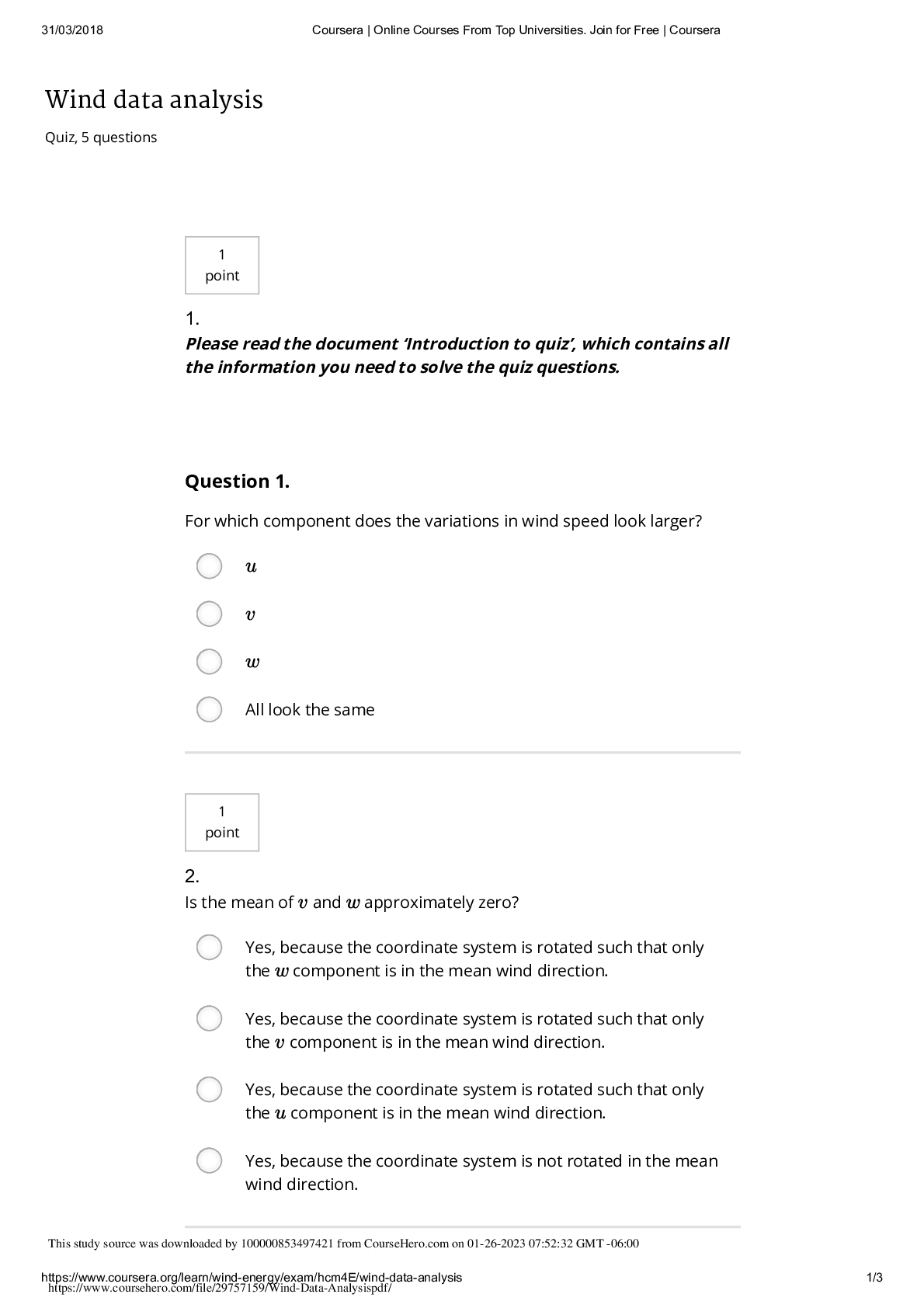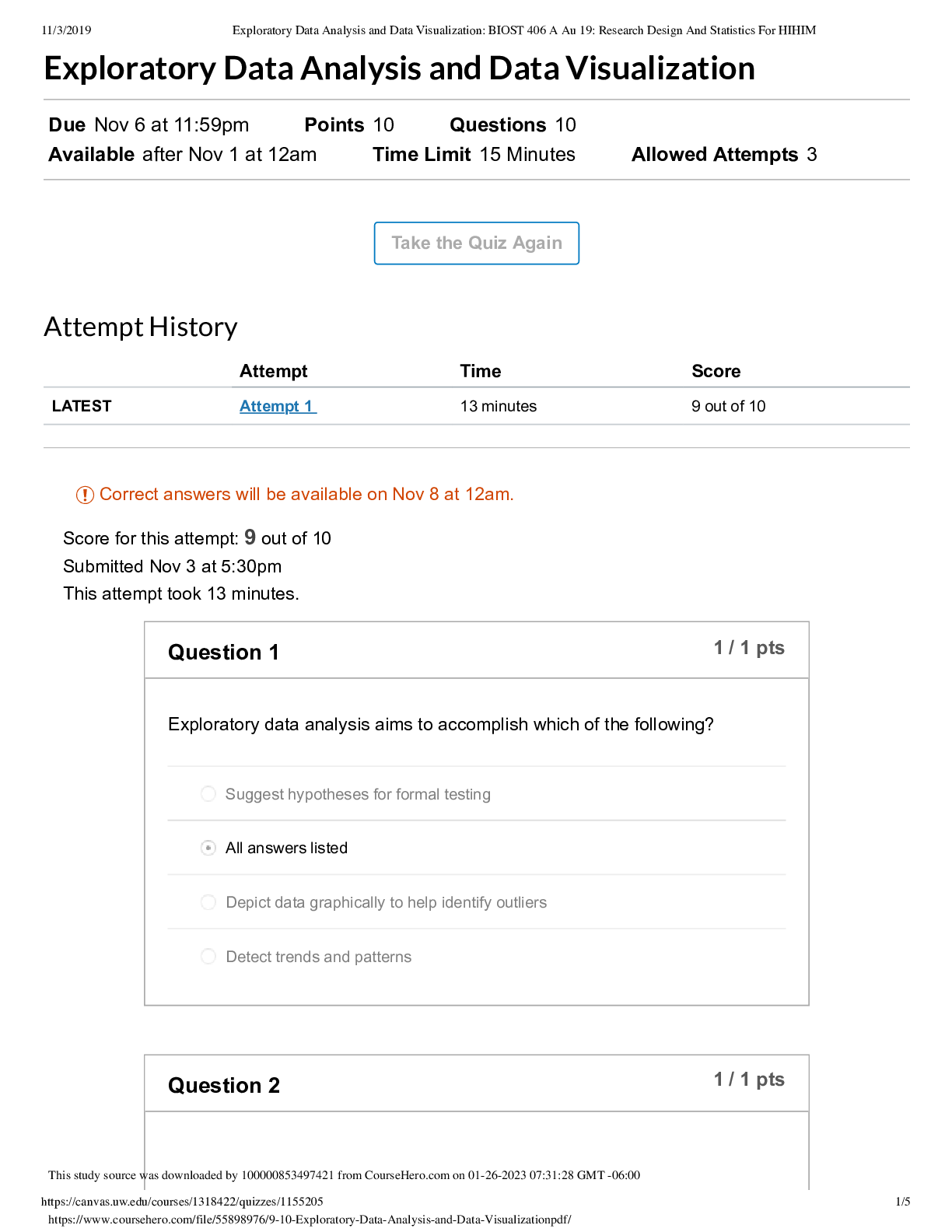Biology > Quiz > Biology Study Guide Test 12 4/25/19 Nutrient Cycles & Biomes | Download for quality grades | (All)
Biology Study Guide Test 12 4/25/19 Nutrient Cycles & Biomes | Download for quality grades |
Document Content and Description Below
Please answer all questions in complete sentences and turn in through Google Classroom in your own words. Note: if you turn in printed out answers, they will be kept to compare to ensure they are un... ique (nobody else has any of those same answers) 1.What are the processes of the water cycle? the cycle of processes by which water circulates between the earth's oceans, atmosphere, and land, involving precipitation as rain and snow, drainage in streams and rivers, and return to the atmosphere by evaporation and transpiration. 2. 3.What are the steps of the water cycle?the cycle of processes by which water circulates between the earth's oceans, atmosphere, and land, involving precipitation as rain and snow, drainage in streams and rivers, and return to the atmosphere by evaporation and transpiration. 4. 5.What is significance of the water cycle?the cycle of processes by which water circulates between the earth's oceans, atmosphere, and land, involving precipitation as rain and snow, drainage in streams and rivers, and return to the atmosphere by evaporation and transpiration. 6. 7.What is significance of the N cycle?The nitrogen cycle is the biogeochemical cycle by which nitrogen is converted into multiple chemical forms as it circulates among atmosphere, terrestrial, and marine ecosystems. 8.What are the processes of the N cycle? atmosphere, terrstrial, marine 9.What are the steps of the N cycle? atmosphere, terristrial, marine 10. What is significance of the C cycle? The carbon cycle is the biogeochemical cycle by which carbon is exchanged among the biosphere, pedosphere, geosphere, hydrosphere, and atmosphere of the Earth. 11. What are the processes of the C cycle? biosphere, pedosphere, hydrosphere, atmosphere 12. What are the steps of the C cycle? biosphere, pedosphere, hydrosphere, atmosphere 13. 14. What is significance of the P cycle? The phosphorus cycle is the biogeochemical cycle that describes the movement of phosphorus through the lithosphere, hydrosphere, and biosphere. 15. What are the processes of the P cycle? lithosphere, hydrosphere, and biosphere. 16. What are the steps of the P cycle? lithosphere, hydrosphere, and biosphere. 17. What are the processes, steps, and significance of the phosphorous cycle? lithosphere, hydrosphere, and biosphere. 18. Which type of bacteria transform nitrate back into nitrogen gas? Nitrosomonas bacteria first convert nitrogen gas to nitrite (NO2 - ) and subsequently nitrobacter convert nitrite to nitrate (NO3 - ), a plant nutrient. 19. What is an aquifer? Groundwater can be extracted using a water well. The study of water flow in aquifers and the characterization of aquifers is called hydrogeology. 20. What is a water shed? an area or ridge [Show More]
Last updated: 2 years ago
Preview 1 out of 3 pages

Buy this document to get the full access instantly
Instant Download Access after purchase
Buy NowInstant download
We Accept:

Reviews( 0 )
$3.00
Can't find what you want? Try our AI powered Search
Document information
Connected school, study & course
About the document
Uploaded On
Nov 30, 2022
Number of pages
3
Written in
Additional information
This document has been written for:
Uploaded
Nov 30, 2022
Downloads
0
Views
133













.png)
.png)







